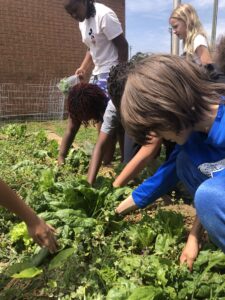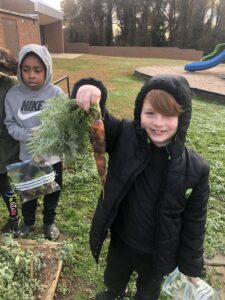School Gardening With Gaston County Cooperative Extension
go.ncsu.edu/readext?1076795
en Español / em Português
El inglés es el idioma de control de esta página. En la medida en que haya algún conflicto entre la traducción al inglés y la traducción, el inglés prevalece.
Al hacer clic en el enlace de traducción se activa un servicio de traducción gratuito para convertir la página al español. Al igual que con cualquier traducción por Internet, la conversión no es sensible al contexto y puede que no traduzca el texto en su significado original. NC State Extension no garantiza la exactitud del texto traducido. Por favor, tenga en cuenta que algunas aplicaciones y/o servicios pueden no funcionar como se espera cuando se traducen.
Português
Inglês é o idioma de controle desta página. Na medida que haja algum conflito entre o texto original em Inglês e a tradução, o Inglês prevalece.
Ao clicar no link de tradução, um serviço gratuito de tradução será ativado para converter a página para o Português. Como em qualquer tradução pela internet, a conversão não é sensivel ao contexto e pode não ocorrer a tradução para o significado orginal. O serviço de Extensão da Carolina do Norte (NC State Extension) não garante a exatidão do texto traduzido. Por favor, observe que algumas funções ou serviços podem não funcionar como esperado após a tradução.
English
English is the controlling language of this page. To the extent there is any conflict between the English text and the translation, English controls.
Clicking on the translation link activates a free translation service to convert the page to Spanish. As with any Internet translation, the conversion is not context-sensitive and may not translate the text to its original meaning. NC State Extension does not guarantee the accuracy of the translated text. Please note that some applications and/or services may not function as expected when translated.
Collapse ▲ Why School Gardens?
Why School Gardens?
School Gardens are not a new concept. They can be found at over 7000 schools in districts throughout the United States. These growing spaces may come in various forms including container gardens, raised beds and even hydroponic and aquaponic growing systems. In some districts, schools may use what is grown in their lunch programs. In others, the gardens are used mainly as a space to demonstrate how to grow certain foods. Though there may be many throughout the country the question remains, why do they matter?
School Garden Benefits
During a time when technology and fast paced lifestyles have become the norm, many children grow up disconnected from the world around them; particularly as it pertains to where their food comes from. School gardens offer an opportunity to serve as educational enrichment spaces that promote hands-on learning, environmental stewardship, healthy eating, and community engagement.
Educational Benefits – School gardens provide experiential learning opportunities for concepts like plant biology, ecosystems, weather patterns, and soil chemistry. Here in Gaston County, Cooperative Extension facilitates a school garden curriculum that aligns with the North Carolina course standards for 3rd grade science as well as Math. Mathematics is applied through measuring garden plots and tracking growth rates. Additionally, literacy skills are strengthened as students document their gardening experiences through journals and writing observations.
The opportunity to use hands-on experiential learning methods helps students delve more deeply into academic content and often leads to measurable increases in content retention rates. According to a study by the Journal of Environmental Education, students involved in garden-based learning programs showed significantly improved performance in science compared to their peers in traditional classrooms.
Health and Wellness – School garden programs help to play a role in promoting the development of healthy lifestyles. With diet related illness affecting increasing numbers of children, the introduction of healthy fruits and vegetables has proven pivotal. In 2019, the Centers for Disease Control and Prevention published an article stating that gardens provide access to healthy food, increase access to nutrition and physical activity opportunities, and are a focal point for community interventions. Gaston County Cooperative Extension’s school garden program uses movement in the garden environment to support sensory engagement. Health and Wellness is also illustrated through being able to taste and even take home what they’ve grown.
Community Engagement – Gardens can also serve as platforms for teaching civic engagement and food justice. Students learn about the challenges of food insecurity and become aware of the needs faced by individuals who are under-resourced in their community. 
Conclusion
Integrating education, health and wellness promotion and community engagement through school gardens can lead to lasting benefits. These include the development of students who are more academically capable, well-informed and compassionate.
If you are interested in bringing this hands-on and engaging program to your students , please complete this interest form and we will connect with you directly. go.ncsu.edu/school-garden
For additional information about school gardening at Gaston County Cooperative Extension or if interested about becoming a volunteer with the school garden program contact:
Marcus Cyprian – School Garden Coordinator marcus.cyprian@gastongov.com




